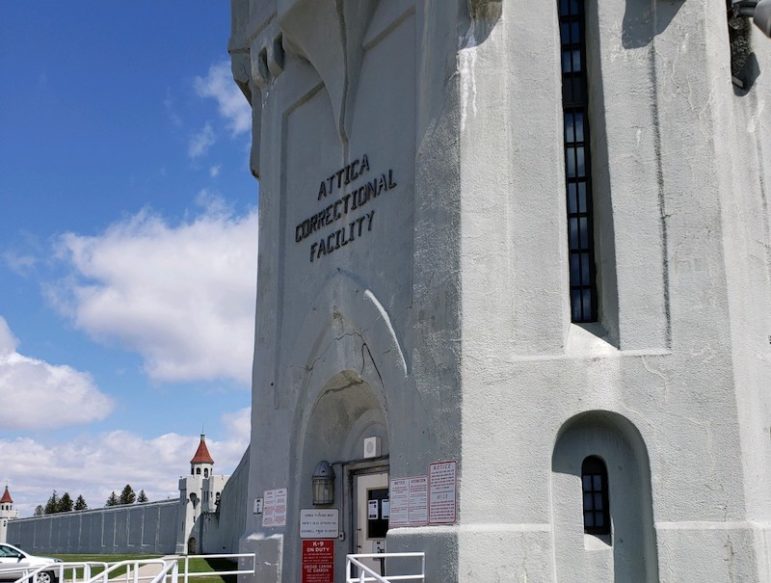‘The governor and state lawmakers continue to ignore calls to end racist violence that happens every day on their watch, out of sight from public view, in their state prisons.’

DOCCS
Attica Correctional FacilityIn the wake of George Floyd, Breonna Taylor, and Jacob Blake’s murders, the world is getting yet another glimpse of the nightmare Black people inherit at birth. In New York, people are re-familiarizing themselves with the names of Sean Bell, Amadou Diallo, Eric Garner, and now Daniel Prude: all unarmed Black New Yorkers murdered by police officers. Their murders are part of a long legacy of brutality and racist criminalization that has forever defined policing in Black communities.
Since Floyd’s murder, Governor Andrew Cuomo has acknowledged racism in policing and within communities across the state. He coupled his words of condemnation with action, signing into law reforms that have been pushed for years by community leaders and family members of people killed by police. Despite this recent action, the governor and state lawmakers continue to ignore calls to end racist violence that happens every day on their watch, out of sight from public view, in their state prisons.
The same racist, state-sanctioned violence that governs police arrests, abuse, and brutality, extends to the courts, jails, and prisons across the state. Behind bars, prison guards have savagely brutalized and murdered incarcerated Black people for decades. In 1983, William ‘Butch’ Harvey, a prison reform activist, was viciously beaten to death by white prison guards in Great Meadow Correctional Facility. At the same facility thirty-five years later, in 2018, a 60-year-old Black man named John McMillon was brutally beaten to death by guards. In the wake of these murders, Governor Cuomo has said and done almost nothing.
 CityViews are readers’ opinions, not those of City Limits. Add your voice today!
CityViews are readers’ opinions, not those of City Limits. Add your voice today!
Racialized violence also includes long sentences with few opportunities for release, a reality that fails to account for a person’s transformation. In August 2019, Valerie Gaiter, an iconic Black woman and leader in Bedford Hills Correctional Facility, died in state custody at 61 years old after being misdiagnosed with cancer. At the time of her death, she was the longest serving woman in a New York State prison, serving 41 years. Despite earning multiple college degrees and mentoring countless peers, Gaiter’s clemency petitions were repeatedly denied.
New York’s racist, barbaric prison system has only worsened during the COVID-19 pandemic. Amidst the pandemic, health experts, epidemiologists, members of Congress, and even District Attorneys nationwide have called on Cuomo to grant clemency to elderly people –especially those with underlying health concerns – but the governor has only granted clemency to three people.
Benjamin Smalls, a 72-year old Black man known across the state prison system as the ‘Elder Statesman,’ contracted COVID-19 while he waited for a response to his clemency petition. He had served more than 20 years and engaged in extraordinary rehabilitative efforts. Cuomo ignored every one of Smalls’ clemency petitions on his desk, even after he was diagnosed with the virus. When it was clear that Smalls would likely succumb to the virus, my colleagues and I advocated for the State to grant medical parole. They didn’t even have the decency to respond to our request.
In early May, Cuomo again displayed his lack of compassion for the health and well-being of incarcerated people, creating a prison nursing home for men 60 and over with underlying health conditions at Adirondack Correctional Facility. Most of the men transferred from the Downstate prisons that had the most COVID-19 cases and fatalities. Yet, none were tested prior to or immediately after their transfer and many with serious underlying health issues are still suffering untreated. In the words of one of the transferred men: “It’s like they sent us here to just fade away.”
If Black lives truly matter, then we cannot forget about our brothers and sisters in prisons across the state. We need more releases, more clemencies, and legislation to end death by incarceration immediately. The lives of New Yorkers depend on it.
Jose Saldana is the Director of the Release Aging People in Prison Campaign. He was released from prison after 38 years of incarceration in January 2018.









3 thoughts on “Opinion: If Black Lives Matter, We Need to Address New York’s Prison Crisis”
Congratulations on your release and for continuing to fight for our people behind bars. NY State has been making progress in Criminal Justice Reform – but we’ve got a long way to go. Please continue to shine a light on these critical issues. Thank you.
Obviously he is biased as he has spent so much time behind bars. I’m going to guess his disciplinary history isn’t very good if he spent so much time behind bars. So Mr needs to write about why he spent so many years behind bars and stop complaining about a liberal system that releases so many killers to prey on innocent people who have a very hard time on receiving pistol permits so they can legally own handguns to protect themselves!
You have got to be a red neck!!!